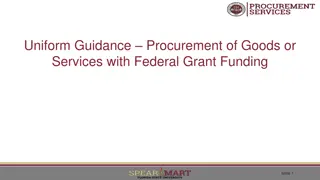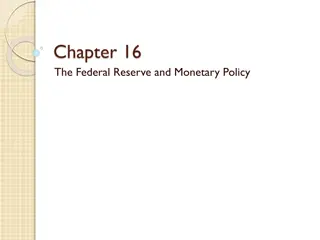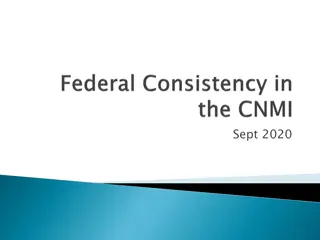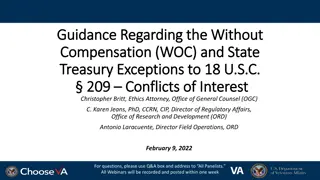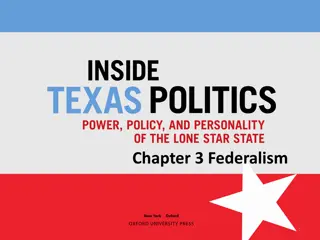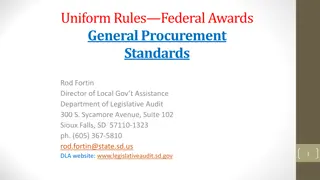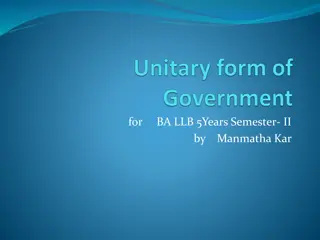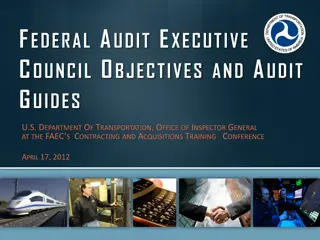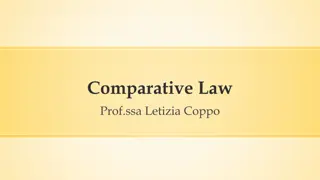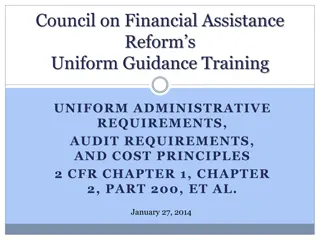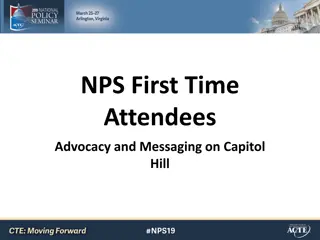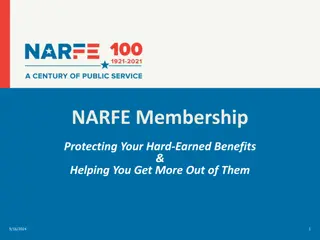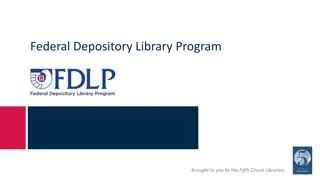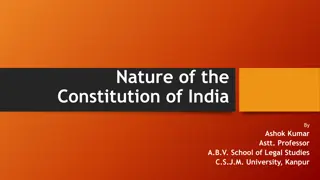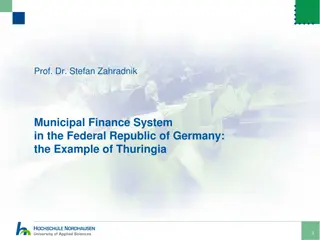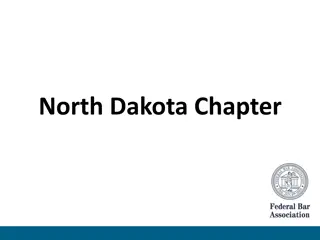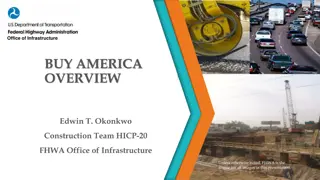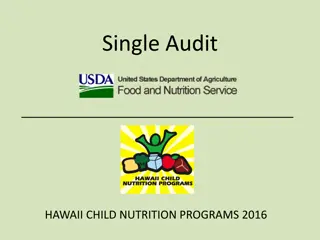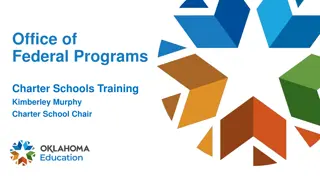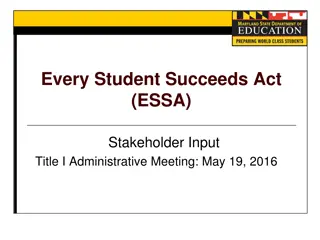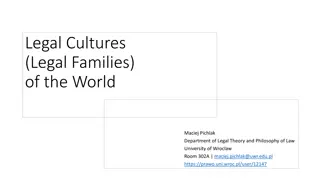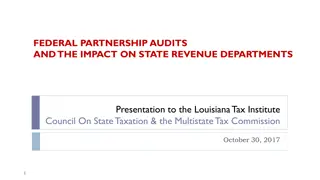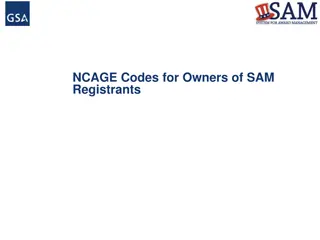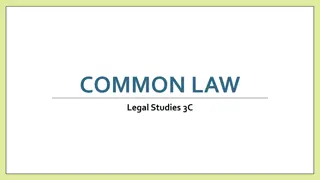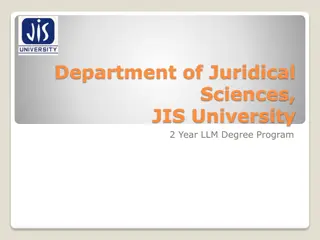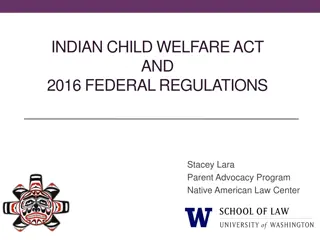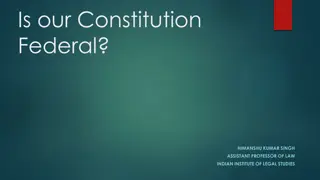Military & Overseas Voting: Special Forms and Deadlines Explained
Military and overseas voters have special forms and deadlines under the Uniformed and Overseas Citizens Voting Act (UOCAVA) and the Military & Overseas Voters Act (MOVE). These laws allow these voters to register and vote absentee in federal elections using forms like the Federal Post Card Applicati
0 views • 25 slides
Federal Grant Funding: Uniform Guidance for Procurement of Goods or Services
When purchasing goods or services, especially with federal grant funding, the process is subject to the Federal Uniform Guidance (UG) and University procurement procedures. The UG outlines different thresholds for procurement, such as Micro-Purchase, Small Purchase, and Competitive Formal Solicitati
0 views • 30 slides
Understanding the Federal Reserve System and Monetary Policy
Delve into the history, structure, and functions of the Federal Reserve System, including its role in implementing monetary policy to stabilize the economy. Explore the establishment of the Federal Reserve Act of 1913, the structure of the Federal Reserve, and its pivotal role in serving the governm
0 views • 35 slides
Understanding Federal Consistency in Coastal Zone Management
This presentation serves as an introduction to Federal Consistency in the context of Coastal Zone Management, emphasizing the importance of compliance with enforceable policies outlined in the Coastal Zone Management Act. It highlights the role of the Division of Coastal Resources Management (DCRM)
1 views • 13 slides
Understanding Gas Laws: Boyle's, Charles', Gay-Lussac's, and Avogadro's Laws
Gas laws such as Boyle's Law, Charles' Law, Gay-Lussac's Law, and Avogadro's Law govern the behavior of gases under different conditions. Boyle's Law relates pressure and volume at constant temperature, Charles' Law relates volume and temperature at constant pressure, Gay-Lussac's Law relates pressu
1 views • 19 slides
Understanding 18 U.S.C. 209 and Its Impact on VA Research Personnel
DOJ guidance has clarified the application of 18 U.S.C. 209 to VA employees receiving compensation from non-Federal entities for research. This law prohibits Federal employees from receiving any form of compensation from non-Federal entities for services expected as Government employees. The webinar
0 views • 20 slides
Understanding Federalism in the United States
Explore the different types of governmental systems and the distribution of power between the federal and state governments. Learn about the advantages of federalism, how Texas utilizes federal funding, and the evolution of cooperation and coercion within the federal system over time. Dive into conf
7 views • 17 slides
Understanding Federal Awards Procurement Standards
Explore the Uniform Rules-Federal Awards Procurement Standards under 2 C.F.R., addressing common federal findings, state versus non-federal entities, and state compliance requirements. The information provided delves into the purpose of procurement standards and the importance of adhering to federal
1 views • 48 slides
Comparison of Unitary and Federal Government Systems
This presentation compares unitary and federal government systems, highlighting differences in the number of governments, constitution type, flexibility, division of powers, supremacy of constitution, judiciary independence, and legislative structure. It explains how unitary governments have a singl
0 views • 7 slides
Contrasting Legal Systems Around the World
Explore the diverse legal families globally, such as Civil Law (Romano-Germanic) and Common Law (Anglo-American), along with their historical backgrounds, sources of law, and dominant ideologies. Delve into the distinctions between Civil Law and Common Law, their origins, development, and practical
0 views • 17 slides
Federal Employment of Individuals with Disabilities Overview
This detailed content highlights the efforts of recruiting, retaining, and honoring federal employees with disabilities, focusing on Executive Order 13548 aiming to enhance employment opportunities for individuals with disabilities. It also provides historical data on disability new hires and the pe
0 views • 49 slides
Federal Audit Executive Council - Contract Closeout Guide Highlights
The Federal Audit Executive Council (FAEC) plays a vital role in coordinating issues affecting the Federal audit community, with a key emphasis on audit policy and operations. The FAEC's contracting committee has developed audit guides covering various topics like acquisition planning, market resear
1 views • 12 slides
Understanding the Federal System in American Law
The American legal system is rooted in a division of powers between the States and the Federal government. Federal law fills gaps and complements State laws, with Federal courts having jurisdiction over disputes involving different States or Federal issues. The Constitution and Bill of Rights protec
0 views • 23 slides
Understanding Combined Gas Law and Ideal Gas Law for Final Exam Preparation
Explore the concepts of Combined Gas Law, Boyle's Law, Charles's Law, Gay-Lussac's Law, and their reflection in the Ideal Gas Law. Learn how to solve problems using these laws, prepare for your final exam scheduled for Tuesday, December 12 at 12:30 in the specified room. Dive into in-class practice
1 views • 23 slides
Understanding Federal Fund Exchange Training Program
The Federal Fund Exchange program allows Local Public Agencies to exchange federal obligation authority for state funds, reducing time-consuming federal-aid project requirements. Benefits include flexibility in project selection, wider scopes, and avoiding restrictive federal provisions. Eligible pr
0 views • 27 slides
Overview of UK Law: Statute Law, Common Law, Criminal Law, Civil Law
Statute Law is written law created through the parliamentary process, forming the basis of the legal system. Common Law, on the other hand, is unwritten law based on judicial decisions and precedents. They govern different aspects such as civil and criminal matters, each with its unique characterist
0 views • 15 slides
Reforms to Administrative Requirements under Uniform Guidance Training
The Council on Financial Assistance Reform's Uniform Guidance Training focuses on changes to administrative requirements, audit requirements, and cost principles under 2 CFR Chapter 1, Chapter 2, Part 200, and more. Major changes include updates to Circular A-102, A-110, and A-89 affecting grants, c
0 views • 62 slides
Overview of Federal Advisory Committee on Insurance
The Federal Advisory Committee on Insurance (FACI) operates under the Federal Advisory Committee Act (FACA) to provide advice and recommendations to the Federal Insurance Office (FIO). The FACI Charter guides its objectives, representative members, and responsibilities, ensuring ethical standards ar
0 views • 13 slides
Advocacy and Messaging Strategies in Federal Education Policy
Exploring the importance of advocacy and lobbying in federal education policy, this content covers topics such as the legislative process, notable CTE priorities, federal funding authorization, and appropriations. It highlights the role of federal advocacy in shaping education policies, influencing
0 views • 29 slides
NARFE Membership: Protecting Federal Benefits & Enhancing Retirement Security
NARFE, the association for federal employees and retirees, is dedicated to safeguarding federal workers' benefits and providing valuable resources for maximizing their retirement savings. Through advocacy and informational resources, NARFE helps federal employees navigate changes in federal policies
0 views • 11 slides
Federal Depository Library Program: Providing Access to Government Information
The Federal Depository Library Program (FDLP) offers free government materials to libraries, ensuring public access to federal information. Established in 1813, the program disseminates resources across 1150 federal libraries, promoting transparency and accountability. Selective depository libraries
0 views • 20 slides
Overview of the Federal Structure in the Constitution of India
The Constitution of India showcases a quasi-federal system with a strong centralizing tendency, as discussed by scholars like Kenneth C. Wheare, Sir Ivor Jennings, and Dr. B. R. Ambedkar. The essential features of a federal constitution, such as division of power, supremacy of law, and distribution
0 views • 4 slides
Municipal Finance System in the Federal Republic of Germany: Thuringia Example
The presentation outlines the municipal finance system in the Federal Republic of Germany, using Thuringia as an example. It covers tax revenue, key allocations to municipalities, fiscal equalization, and the structure of the federal and state governments. Various taxes, including federal, municipal
0 views • 12 slides
Federal Reporting Entity Update: Highlights from FASAB Review
Explore the latest updates from the Federal Accounting Standards Advisory Board (FASAB) review, including insights on the reporting model, risk considerations, assumed leases, and public-private partnerships. Learn about the significant changes in federal financial reporting entities and the impleme
0 views • 25 slides
The Continuing Relevance of English Law to Irish Corporate Law Reform
English Law remains relevant in Irish corporate law reform, impacting areas like takeover regulation, deferred prosecution agreements, schemes of arrangement, and the comply or explain approach. The influence of English law is seen where there is no EU law dimension or when EU legislation allows mem
0 views • 10 slides
Federal Bar Association: Strengthening the Legal System
The Federal Bar Association (FBA) is dedicated to enhancing the federal legal system and promoting justice through its support of federal practitioners, the judiciary, and the public. With over 17,000 members nationwide and a strong focus on community engagement and professional development, the FBA
0 views • 15 slides
Classification of Law: Understanding Different Types and Functions
Exploring the classification of law is essential for understanding the diverse nature of legal systems. This overview delves into domestic law vs. public international law, public law vs. private law, and the sub-divisions within public law, such as constitutional, administrative, and criminal law.
0 views • 19 slides
Understanding Buy America Requirements in Federal Infrastructure Projects
This presentation provides an overview of the Buy America requirements as mandated by the Federal Highway Administration (FHWA) and outlined in the Bipartisan Infrastructure Law. The Buy America regulations apply to iron, steel, manufactured products, and construction materials, requiring that these
1 views • 20 slides
Understanding Single Audit Requirements for Hawaii Child Nutrition Programs 2016
In accordance with federal regulations, non-Federal entities that expend $750,000 or more in Federal funds, including USDA's child nutrition programs, are required to undergo a Single Audit. The audit must be completed within nine months of the organization's fiscal year-end, and the final report mu
0 views • 5 slides
ASRC Federal: Supporting Indigenous Communities with a Commitment to Sustainability
ASRC Federal, a leading Alaskan-owned company, embodies a deep-rooted commitment to supporting Indigenous communities and preserving cultural values. Through partnerships with organizations like NOAA and a focus on environmental stewardship, ASRC Federal demonstrates a dedication to sustainability a
0 views • 11 slides
Overview of Legal Systems and Roman Law Development
Legal systems play a crucial role in governing societies, with Roman Law, Common Law, Civil Law, and Religious Law being some of the major types worldwide. Roman Law, focusing on private law, has influenced legal traditions in various regions, especially in Europe. Contrasting Common Law and Civil L
0 views • 26 slides
Federal Grants Training for Charter Schools
The Office of Federal Programs at OSDE offers training and support for charter schools in accessing federal grants, particularly focusing on Title I, Part A eligibility requirements. The program ensures economically disadvantaged students receive equal educational opportunities and emphasizes the Su
0 views • 16 slides
Overview of Changes in the Every Student Succeeds Act (ESSA)
The Every Student Succeeds Act (ESSA) signifies a significant improvement over the No Child Left Behind Act (NCLB) by returning control to states and localities. ESSA maintains a federal role to support and strengthen education without dictating requirements, emphasizing a balance between federal ov
0 views • 21 slides
Comparative Analysis of Legal Families Around the World
Explore the diverse legal cultures and families existing globally, including Civil Law, Common Law, Far East, Islamic, Hindu, and more. Learn about the historical background, methods of reasoning, institutions, sources of law, and dominant ideologies that characterize each legal family. Delve into t
0 views • 17 slides
Understanding Federal Partnership Audits and Their Impact on State Revenue Departments
The presentation discusses the impact of federal partnership audits on state revenue departments, emphasizing how states benefit from federal audit efforts. It covers topics such as reporting federal audit adjustments, the background of federal audit adjustments, and the final determination process.
0 views • 51 slides
Understanding CAGE and NCAGE Codes in U.S. Federal Contracting
The U.S. Federal Acquisition Regulation (FAR) mandates that potential contractors register in the System for Award Management (SAM) to receive federal contracts. A new regulation effective since 2014 requires offerors to disclose owner details, including Immediate Owner and Highest-Level Owner, with
0 views • 12 slides
Overview of Legal System in Australia
This content covers various aspects of the legal system in Australia, including common law, sources of law, court hierarchy, appeals process, federal courts, and the importance of judicial independence. It outlines the key components of the legal framework, such as the role of Parliament, judge-made
0 views • 36 slides
2-Year LLM Degree Program in Juridical Sciences at JIS University
Explore the 2-year LLM degree program offered by the Department of Juridical Sciences at JIS University, specializing in Corporate Law, Criminal Law, and Constitutional Law. The program covers a range of specializations such as Comparative Criminal Law, Human Rights, Corporate Law, Competition Law,
0 views • 7 slides
Overview of Indian Child Welfare Act and 2016 Federal Regulations
The Indian Child Welfare Act (ICWA) of 1978 is a federal law that aims to protect the best interests of Native American children and promote the stability of Indian tribes and families. The law establishes minimum federal standards for the removal and placement of Indian children, reflecting the uni
0 views • 27 slides
Understanding the Federal Features of the Indian Constitution
The Indian Constitution exhibits a unique blend of federal and unitary characteristics, termed as quasi-federal. This constitutional setup grants power to both the center and states, yet allows for central intervention in certain circumstances. The Parliament holds authority over creating new states
0 views • 4 slides

